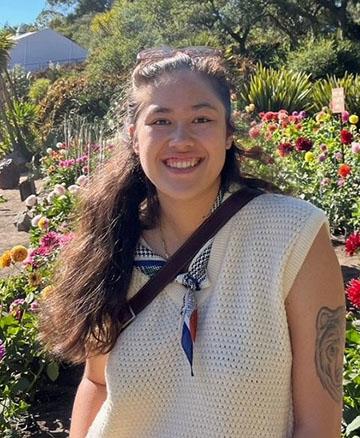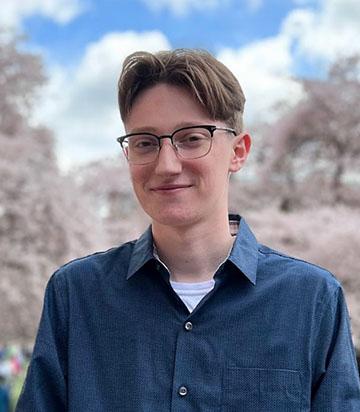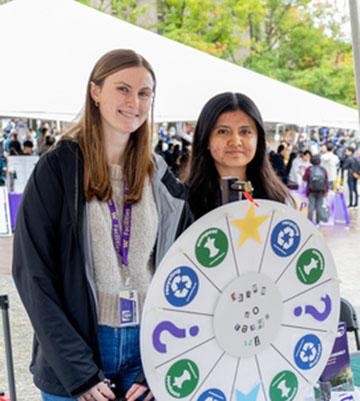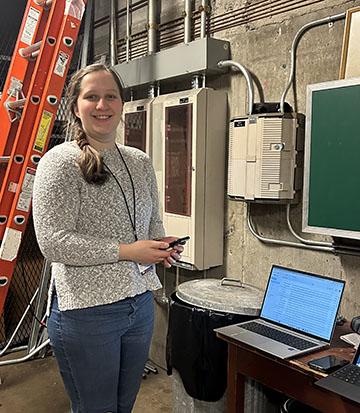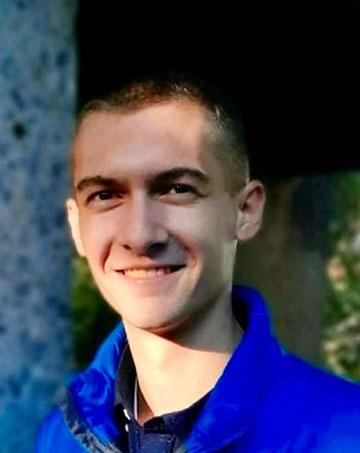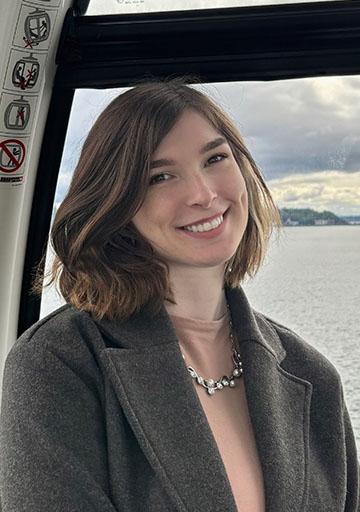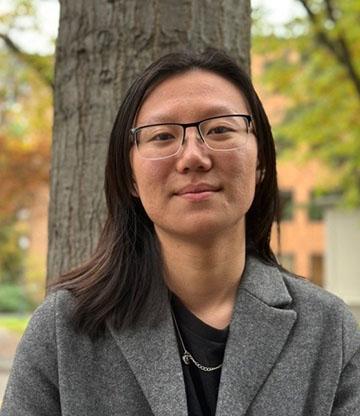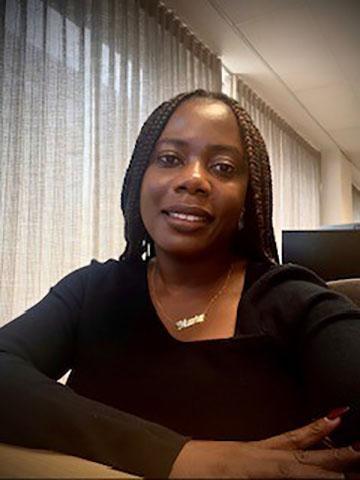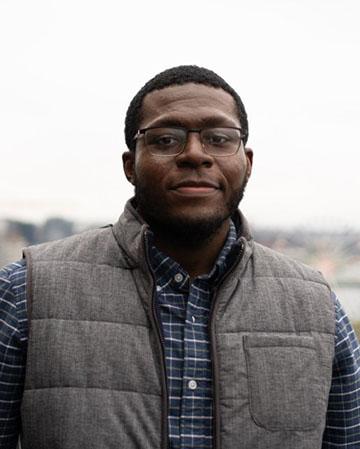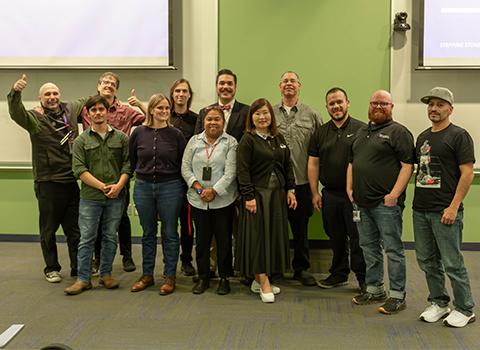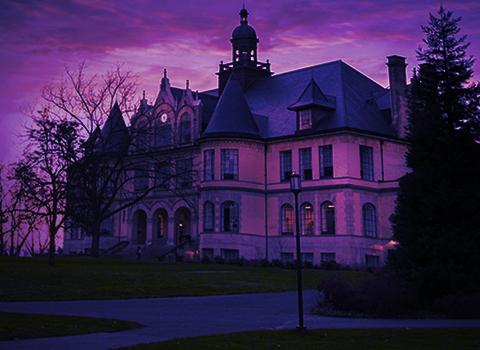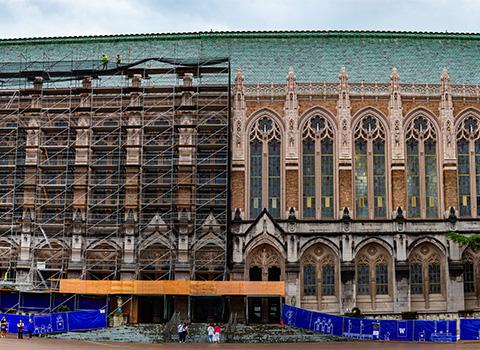Congratulations, 2024 UWF student graduates
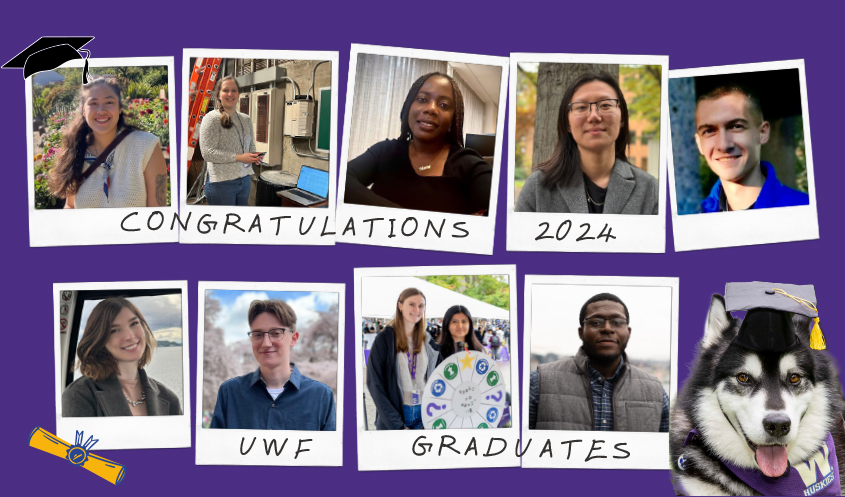
Student employees are an important part of the UW Facilities (UWF) family, with more than 90 working in varied functions across the department. Hands-on learning opportunities include helping customers at the UW Surplus store, educating the UW community about recycling, creating 3D models of mechanical rooms, helping to decide how to fund sustainability projects on campus and more.
We asked a few of our graduating student employees and interns how their time at UW Facilities helped prepare them for life after college. All interviews have been edited for length and clarity.
Tatiana Brown
Academic program: Graduate, Health Services & Public Administration
Where they worked at UWF: UW Sustainability
Tell me about yourself. Where are you from?
I am originally from Virginia, and I went to school for my undergrad in Richmond [at Virginia Commonwealth University]. I studied anthropology, and I got into food justice work, and I also worked in health policy and worked with marginalized communities on access to health care. I was doing a lot of advocacy for policy change. And Richmond, being the capitol, was a very good place to get to work with legislators. So that's the reason that I came to University of Washington. It was the only school where I was really able to pursue a dual degree between public health and public administration and public policy.
What are you interested in doing for your career?
My interests have changed quite a bit since I came here. I was originally focusing on social policy, and I really thought I wanted to do stuff around the health care system. I’m the Associate Program Director for the Campus Sustainability Fund. Since being in the job, a lot of my focus has really changed towards environmental justice and climate justice, because that's really the umbrella that we want to talk about when we talk about differences in health outcomes.
I've really taken an interest in local government. I'm finishing my thesis now, and it's focusing on the intersection between the economy and the environment and our health. And so a lot of what I focus on is, how do we create different economic systems that actually are promoted or based around community health?
What did you do as part of your student position?
I do our day-to-day operations, and I supervise our core team. I also do our strategic visioning and meet with a lot of our partners. We have two main programs. One of them is grant-making. We also do education around justice-centered sustainability. And so a lot of what I've been trying to do in the last three years is really try to make it clear how we approach sustainability and that it's not like the traditional environmental version of sustainability — but trying to make sure that people also know that sustainability is inherently tied towards justice. You cannot have sustainability while existing in predominantly extractive relationships, which white culture promotes.
I think the change has been clear by seeing what type of grant applications we get. We now fund a lot of cultural events on campus that focus on cultural continuity and active practice of tradition. So we funded the Powwow by First Nations the last several years. Also Polynesian Day, which is an amazing event.
What's been your favorite part?
My favorite part is the mentorship component. [My teammates] Kort and Boe are incredible. They're so smart and also cool. And I've also had the opportunity to oversee some capstone students. We are definitely a strong team, because we're actively working together and leaning into everyone's strengths. Working on a team that is such a joy to work with but also getting to see the impact that we create together — and then feeling like we all have our own creative freedom — is so so fun.
How this job prepared you for what's next?
There's been continued application of what I've been learning in my courses, especially my Public Policy and Administration degree. It's prepared me extremely well in terms of improving my skillset as a program manager. Also, in this role, I sit on a lot of different committees at the University like the Environmental Stewardship Committee and the Sustainability Action Plan Executive Council. So it's been really good in terms of continuing my organizing skills. Getting to build official partnerships with so many different entities on campus is great practice for working with different community groups or coalitions. It's prepared me in feeling like this is the field that I should be going into. If I didn't have this role, I wouldn't have really been as aware of sustainability and environmental justice. I also definitely would not have the confidence to go for it.
Jonathan Bechtol
Academic program: Undergraduate, Architectural Design
Where they worked at UWF: Campus Architecture and Planning
Tell me about yourself. Where are you from?
I’ve lived in Western Washington my whole life. I grew up in Snoqualmie. Because of that, I developed a love for the outdoors and spent a lot of time in nature as a kid. I've also kind of always wanted to study architecture as well, in particular sustainable architecture — how the built environment can interact with and support the environment.
What are you interested in doing for your career?
I'm about to actually come back for a two-year masters of architecture program and then after that, going into professional practice in architecture — again, with a specific focus on more sustainable, regenerative design.
What did you do as part of your student position?
I've been working with Campus Architecture and Planning to research and write about the past 30 years or so of architectural history here at UW. It's sort of meant to be a continuation of Norman Johnston's book “The Fountain & the Mountain,” which was published in 1995. And that details the first 100 years of architecture on the UW campus.
What's been your favorite part?
My favorite part has been getting to research and explore different buildings that I probably otherwise would never interact with. It's given me a much greater appreciation of the campus — a greater sense of place, a sense of belonging. I think that's something that we want other people to kind of get out of it as well when they end up reading the document. And then my supervisors Kristine Kenney and Julie Blakeslee have been really, really helpful and supportive.
Do you have a favorite building?
Definitely, I've thought about this a lot. I think my favorite building, pretty ironically, is not one that I actually researched for this project. But it's probably Gould Hall, which is where the Architecture Department is located. The exterior is not all that exciting. Then once you get inside, there's this really cool atrium and staircase. It's one of those buildings that you have to go inside and it surprises you.
How has your student position prepared you for what's next?
As part of this project, I’ve had the chance to interview a bunch of different architectural firms that have done some work on campus, and it's been really great to learn about how they've approached different design challenges and some of the solutions they've come up with to certain constraints — because a lot of times in school, it's a lot more conceptual. You’re allowed to suspend reality. The real world is very different. So I feel like I've learned a lot of different strategies that I can, hopefully, potentially use in the future.
Taylor Clementz and Florencia Gonzalez-Martinez
Academic program: Undergraduate, Environmental Studies & Food Systems (Taylor); Undergraduate, Environmental Studies & Geography (Florencia)
Where they worked at UWF: UW Recycling
Tell me about yourself. Where are you from?
Taylor: I'm from Athens, Georgia, so coming to Seattle was a big change for me. I have really loved my four years here. I think it's a great place to go to college with a lot of opportunity. And I love being outside. The scenery here is something that's a lot different from Georgia and was really nice to have in Seattle.
Florencia: I'm from Tacoma, Washington. So not a big of a change but a bigger city [which is great] because I plan to be an urban planner. And so I got into this internship because I want to get more experience with how cities work and how every moving part is connected and functions together.
What are you interested in doing for your career?
Taylor: A little over a year ago, when we both started this position, I had no idea what I wanted to do, and I still am not quite sure. But next year, I will be working in an environmental health and safety (EH&S) related position for a publicly traded company in Indiana. And I think that this role has given me great experience and an understanding of a lot of the ins and outs of a campus community and all the aspects that go into making a community function and run. EH&S plays a part in that. I think that probably won't be what my whole career is, but it's definitely a place that I'm very excited to start in.
Florencia: I kind of have an idea of what I want to do. Urban planning with a focus on GIS. So that's how I combined both of my degrees in environmental studies and geography data science. I just really like maps and people.
What did you do in your student position?
Taylor: Something I did regularly is working on contamination [in recycling bins] on campus. So we get contamination notices from our recycling vendor about different residence halls that have contamination in their hall. It's pretty much always the same type of things: food containers, compostable containers from Housing and Food Services, plastic bags is a really big one, black trash bags. We try to figure out: how do you engage with students in a way that they will really take in what you're saying and what you're trying to teach them? And then take that out into how they live. It's definitely a challenge. [I also worked at] a lot of educational events, tabling around campus at UW Welcome Day, Dawg Days, the Sustainability Fair.
Florencia: I work more on floor plans, like helping clean up any spreadsheets or folders on our server. I help maintain infrastructure. And sometimes I do some analyzing of user interaction from our Instagram Stories.
What's been your favorite part?
Taylor: We have a really great team; everyone is just so awesome. Florencia and I came in at the end of our junior year and now we're seniors. Everyone has been very helpful with our day-to-day tasks in the office, but then also really supportive as we try to figure out what we're gonna do next and providing advice and support where they can. That’s something that's awesome and has taught me a lot about having an office culture. It's really important to me to be successful in a job.
Florencia: My favorite thing was tabling, getting to talk to staff and students just to understand that everyone doesn't have a similar background. There's a stereotype of Washington residents knowing how to recycle compared to others. Other states don't have accessibility to recycling, so [people from there] don't really know how to sort their garbage. And then the first time they've ever encountered sorting garbage is here in Washington. It's very interesting to learn about everyone's background and to help them understand how the whole sorting process goes.
How has this job prepared you for what's next?
Taylor: We work with a lot of campus groups so figuring out how to have those types of conversations across groups or doing things that are interactive has really taught me a lot about how to how to work in a professional environment. And it's my first office job, so I think I've gained a lot of communication skills like how to be as concise and direct as possible. [Particularly for] emails, because you want to make sure that what you're saying is as clear as possible and there's not room for error. Those are really important lessons that I've learned here that'll help me a lot next year.
Florencia: It's my first office job as well. So I learned a bunch about office etiquette. And I learned how to communicate better both professionally and to the general public. And I also have gotten a lot better with time management because I realize that I need to be better at sticking to deadlines and being able to organize my academic life, my job and personal life all together. That was kind of a learning curve, but I think I got a lot better, and I feel like I'm a lot more experienced now.
Sarah Gest
Academic program: Undergraduate, Environmental Engineering & Geography
Where they worked at UWF: Business Innovation & Technology
Tell me about yourself. Where are you from?
I’m from the Seattle area.
What are you interested in doing for your career?
I want to do something in GIS whether that be geospatial intelligence or more of the engineering side of mapping. Geospatial intelligence has to do with using intelligence data that has locational aspects, so it is often used by federal agencies. However, I am still not sure yet what I specifically want to do.
What did you do as part of your student position?
One of our main tasks for this year is to map mechanical rooms. All the buildings have mechanical rooms that help run the processes in the building like the lights, air and water. We go into the mechanical rooms and we scan them with a LiDAR sensor that is using a laser to measure distances. This allows us to create a 3D walkthrough of the room that can be used for inventory and maintenance purposes. We also make maps that are needed for Facilities and then we help with inventorying meters for one of the metering projects. We tag along on some of those adventures to try to find the meters and figure out if they are functioning properly with the network.
What's been your favorite part?
One of my favorite parts is the people I get to work with. I am excited to come to work because I have such great co-workers. Also, I like that it's different every day and we get to do a wide range of things. I do not feel stuck behind a computer all day.
How has your position prepared you for what's next?
I think the position has allowed me to gain technical skills while having a lot of new experiences. We have been able to fly drones, use LiDAR, look at meters, create maps and use different software. I think that exposure to the different types of software and applications provides a good breadth of knowledge that will be incredibly valuable looking forward. The internship has also given us the opportunity to develop our soft skills. We have been able to practice talking to clients, presenting and getting feedback from a manager. I feel like those are very valuable skills for any job in the future.
Micah Glasby
Academic program: Undergraduate, Mechanical Engineering
Where they worked at UWF: Fleet Services
Tell me about yourself. Where are you from?
I'm a local boy — more or less born and raised on Bainbridge Island.
What are you interested in doing for your career?
I am going off to join the Air Force. I’m going to become a chaplain. Next, I am off to pursue my divinity degree at Western Seminary in Portland.
What do you do for your student position?
I kind of serve as a secretary of sorts. I’m an assistant to both the UCAR side and to the shop side. So I get to see a little bit of everything and help with entering paperwork and emails and answering phone calls.
What's been your favorite part?
I really enjoy working with the people here. It's a really, really great team. The bosses are great. The co-workers are great. The guys in the shop are always a hoot. It's a good time.
How has the job prepared you for what’s next?
I mean, it's not quite a direct connection [between my job and being a chaplain], but there's a certain amount of the basic interpersonal people skills that definitely translates not only to chaplaincy but really to anything that I want to do from here. I need to be able to interact with people who walk in grumpy and answer questions and go find the person who knows the answer and that sort of thing.
Sarina Meyer
Academic program: Undergraduate, Cinema and Media Studies
Where they worked at UWF: UW Surplus
Tell me about yourself. Where are you from?
I was born in Renton, so very local, and this was my dream school when I was younger. It took a little bit of time to actually get here. I did community college for a bit and decided to jump right in and now I'm here. And I'm tired but excited.
What are you interested in doing for your career?
Advertising or social media marketing, which I’ve been pretty passionate about even when I was a kid. I would do these little side hustles where I would post on Instagram and try to get people to look at it to buy goofy t-shirts. Literally just two weeks ago, I started a sticker and keychain craft business. I was at the UW Makers Fair with my roommate. So it's kind of fun beginning to put in practice again — simple things, kind of testing the waters again.
What did you do as part of your student position?
I do a lot of the online postings for UW Surplus. So I'll look around the store, pick out items that I think would sell well online, photograph them, write descriptions and throw them on the website.
What's been your favorite part?
I like how independent it can be. Becky [Ryser, Surplus’ program supervisor] just trusts me to pick some cool items to put on. So being able to look around and be like, “Okay, well what the heck is this? What, I've never seen this?” Sometimes we get the coolest stuff. And so it's kind of fun that they trust me to be able to see what works and what doesn’t.
How has your job prepared you for what's next?
Well, it's definitely helped me get more experience with online posting and knowing what the demand is, because sometimes I'll choose certain things or I'll make certain decisions where I'm like, “I'm not so sure about it.” And actually, that's the item that sells the quickest. There are other things where I'm like, “Oh, this will sell for sure" [and then] it doesn't. It's helped me get more experience with asking myself, how do I navigate what people want, rather than what I want? I’ll watch Becky put together some of the social media posts so it's also very fun to secretly take notes, like “Oh this is really cute” or “Oh, she uses that program?”
Danica Nguy
Academic program: Undergraduate, Information systems & Operations Supply Chain Management
Where they worked at UWF: Business Innovation & Technology
Tell me about yourself. Where are you from?
I'm from Seattle, Washington. I've been here all my life. While I work [at UWF] as a BIT student assistant, I’m also a resident advisor for UW at McMahon. My family lives in Vegas right now, so I plan to move in with them after my graduation.
What are you interested in doing for your career?
I would like to continue doing something more on the IT service help desk. I've always enjoyed doing customer service jobs. I worked as a tutor up until high school, and then I worked at Chipotle for about a year because they offered tuition reimbursement. Then I got this job and I became an RA too. All my life, my jobs have involved talking with other people. So I think I would like to continue on that path. Hopefully something more IT-related like this job. But IT is something that I might like to take a break from. I would like to go into supply chain because that's my other major.
What did you do as part of your student position?
The main thing is just helping out anyone who sends a ticket to the [Facilities IT] email address. All the tickets I am able to do are separated into Tier 1 — that's for all the student assistants. They can look at that and see if they can do it. Most of my tickets revolved around helping with user errors like Outlook or Excel, like if they're crashing. I did a lot of installations for printers and then also just installing programs in general because you do need the admin password for it. I did computer imaging a lot, where we're just wiping out computers and then giving them to new employees or old employees returning their computers. A lot of my work is helping people remotely. Like I would call them using Quick Assist, and I'd be like, “Can I use your mouse clicker?”
What's been your favorite part of the position?
Interacting with people was my favorite part. With emails, you never know what they're looking for. [Sometimes] the email is just, “Hey, I need help with this” or “I have an issue” but then they don't elaborate. So my favorite part is calling them and saying, “What actually is the problem?” That’s why I want to continue with IT Help Desk — because I love calling people. Even better if I could go approach them right away in person.
How has your job prepares you for what's next?
It's helped reinforce that I love working with computers. I want to continue doing something similar to this job in the future. I've learned a lot throughout this entire job in general. Before I started, for example, I had no idea how to do imaging and I also wasn't very fast at connecting printers or resolving tech issues. [Now, seeing] everyone else getting so many errors, the error is familiar. I know what to do when this error pops up now. There's a pattern and because of that, it helps me in my personal life when I get the same error. It's quite fun.
Olushola Olatunde
Academic program: Graduate, Real Estate
Where they worked at UWF: UW Real Estate
Tell me about yourself. Where are you from?
I’m originally from Nigeria. I have had the pleasure of being in the U.S. for the last four years, and I did my undergraduate degree in real estate management and banking in Nigeria.
What are you interested in doing for your career?
Post-graduation I’m exploring opportunities that are available to me within the corporate real estate and asset property management aspects of real estate. But I'm looking several years down the line at eventually owning my own real estate organization.
What did you do as part of your student position?
I've had the opportunity to sit in on very high-profile meetings and strategy meetings with my executive director. I've had the opportunity of working on some really high-impact projects, like the West Campus Visioning Committee, where I got to work on development projects that are happening around Portage Bay Crossing. Then I got to work with lease management for the Assets Management team. I did a lot of drafting, reviewing and putting together lease documents and a whole lot of other things like the annual asset walk line that we always get to work on as interns.
What's been your favorite part?
Oh, that's a no brainer. Apart from the opportunity to learn — because before this, I had not worked in the U.S. so it was my first working experience here — it's working with such a dynamic team as the UW Real Estate team. The people there are just very fantastic, and they are very invested in what you do. These are people who are willing to mentor you, help you and guide you and see that you're doing very well. They make sure that you enjoy what you're doing.
How has your internship prepared you for what's next?
An internship with the UW Real Estate office just opens your eyes to the variety of aspects and how vast real estate is actually. There are hardly any aspects of real estate that I did not get to touch — many are major developments — in the course of the internship. So for me, that's a big deal. That is something that I will cherish. I feel very prepared to go into almost any aspect of real estate that I fancy, because I've had opportunities to work on a variety of projects and aspects of real estate.
Nadir Roberts
Academic program: Graduate, Communication
Where they worked at UWF: Communications
Tell me about yourself. Where are you from?
I am from New Jersey, the Garden State. I love music and sneakers, and I think a lot about pop culture.
What are you interested in doing for your career?
I am interested in working in the content design, technical writing realm. My background is in journalism, and I used to write entertainment articles for a newspaper. That sort of shifted for me to writing step-by-step articles, and that's what this internship really helped with — and content design in terms of laying out content and figuring out what makes things best for the user in terms of not just visual components, but also words and copy. So it's really combining a few different aspects of my previous experience.
What did you do as part of your student position?
I was helping to migrate content from Drupal 7 to Drupal 9 [which are different versions of the content management system for UWF websites]. And this meant updating the web procedures and how-to articles that help employees log in and figure out content for the various web editors, whether it be for the Surplus Store or for Transportation Services. I was helping update, rewrite and edit some existing procedures.
What's been your favorite part?
I think my favorite part of the internship was being able to present ideas to my manager, Andy, and him being open to the idea of trying things and being able to explain my reasoning and have it be considered. I liked having a role and a seat at the table. I appreciated that.
How has your internship prepared you for what's next?
It's given me the confidence to talk about my experience. I had to basically become a subject matter expert in everything for this content management system, Drupal. So it's given me something else to talk about in my interviews. It's given me the confidence to really show that I did this work and I know what I'm doing. And it's helped me with working with different people and just growing as a person overall.
